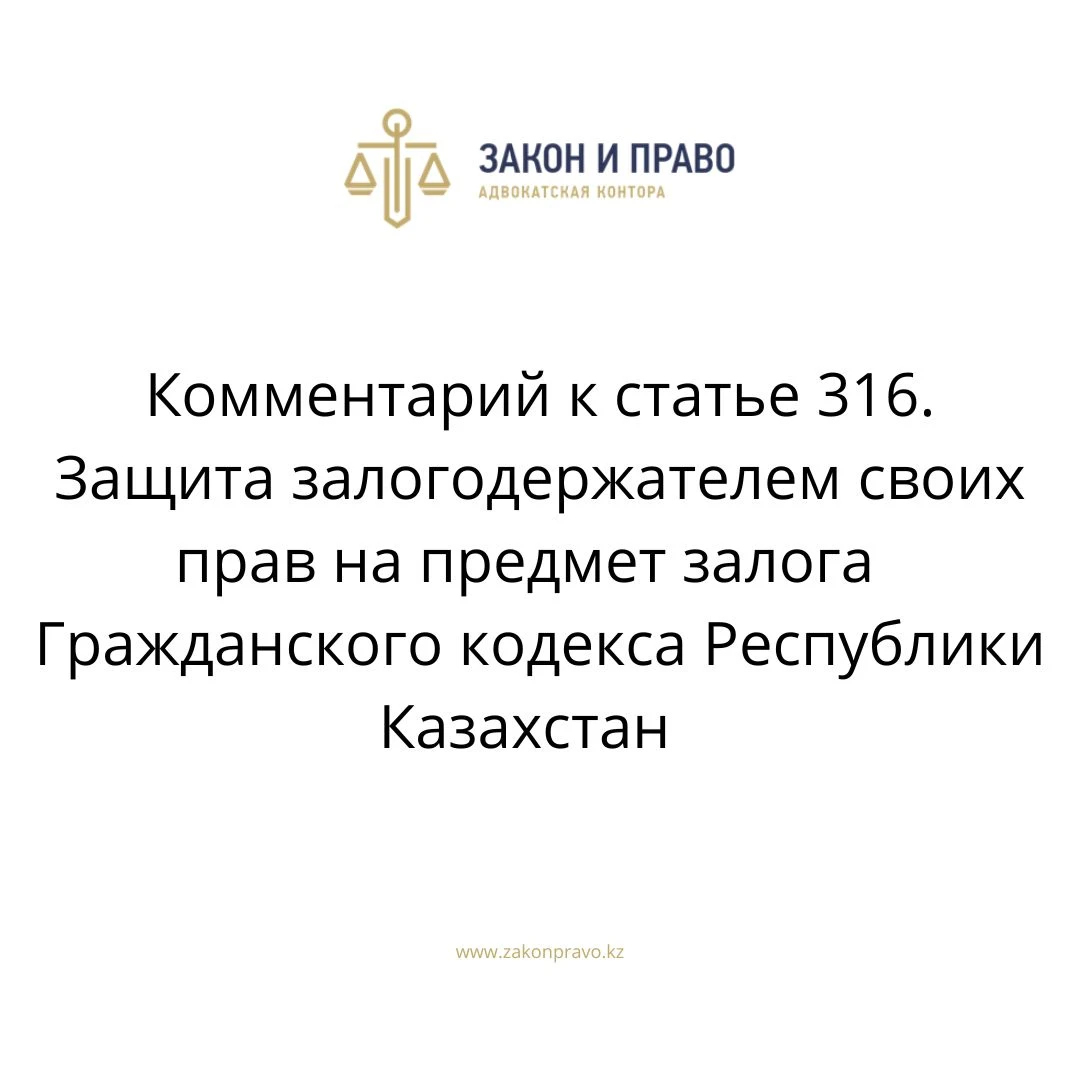Comment to article 316. Protection by the pledgee of his rights to the pledged object The Civil Code of the Republic of Kazakhstan
The real nature of the pledge right is most clearly manifested in the right of the pledgee to "claim" a thing - an object of pledge that has left his possession or the possession of the pledgor (debtor) (see the commentary to paragraph 1 of art. 310 of the Civil Code). Being primarily the right of the mortgagee to the thing in accordance with an agreement with the other party to the pledge legal relationship, the pledgor, at the same time, the right of pledge is protected from violations by third parties and in this respect is similar to the right of ownership.
Just like the owner, the mortgagee has the right to claim the thing that has been removed from the possession of himself or the mortgagor (debtor) from the person whose possession of this object is illegal (see art. 260 of the Civil Code and commentary to it). Despite the fact that paragraph 1 of the commented article refers only to the mortgagee, who had or should have had the mortgaged property, it must be recognized, in accordance with art. 265 of the Civil Code, such a right to claim mortgaged property from someone else's illegal possession in order to restore one's right of pledge belongs to any mortgagee, regardless of whether the mortgaged property was or was not in his possession, whether it should be or not.
If the pledged property has fallen out of the possession of the pledgee, the issue of the legality or illegality of the possession of this property by another person must be resolved upon the claim of such property as if the pledgee were the owner of this property. Therefore, in such cases, the mortgagee has the right to defend his possession against the owner.
If the pledged object has been unlawfully removed from the possession of the pledgor, then upon the claim of this property by the pledgee, the possession of this object by a third party must be recognized as illegal. This means that if the right of pledge excludes the possibility for the pledgor to sell or transfer the pledged property to someone (see, for example, the commentary to paragraph 2 of Article 315 of the Civil Code), but the owner of such property nevertheless does so during the validity of the pledge prohibiting alienation without the consent of the pledgee, possession of this property by a third party-the acquirer must be considered illegal.
With regard to the conditions of vindication provided for in Articles 261-263 of the Civil Code, the mortgagee claiming the pledged property on the basis of Articles 316 and 265 of the Civil Code must enjoy the same rights as the owner of the property being claimed or, in appropriate cases, as an organization with the right of economic management.
The claim of the pledged property by the pledgee on the basis of Articles 316 and 265 of the Civil Code should be aimed at restoring the situation that existed before the transfer of the pledged object into someone else's illegal possession. As a result of the elimination of this violation - the termination of illegal possession - the mortgagee cannot acquire more rights to the mortgaged property than he had before such violation. Therefore, if the pledged object, which is not subject to transfer to the pledgee, has left the possession of the pledgee, the claims of the pledgee may be directed only to the restoration of ownership of this property by the pledgee.
According to paragraph 2 of the commented article, the pledgee, to whom, under the terms of the pledge agreement, the pledged object has been transferred and the right to use the pledged property has been granted, has the right to demand, on the basis of Articles 265 and 264 of the Civil Code, the elimination of such violations of his rights to the pledged object transferred to him, which are not related to the deprivation of his possession of this object. The pledgee has the right to demand the elimination of such violations from the owner of the property (the pledgor). This rule is applicable, however, only when the rights of the mortgagee granted to him as the subject of the pledge legal relationship are insufficient to eliminate these violations.
Constitution Law Code Standard Decree Order Decision Resolution Lawyer Almaty Lawyer Legal service Legal advice Civil Criminal Administrative cases Disputes Defense Arbitration Law Company Kazakhstan Law Firm Court Cases
The commentary was prepared within the framework of the scientific and practical research program of the Scientific Research Center of Private Law of the Kazakh State Law University.
Head of the working group on the preparation of the draft Civil Code of the Republic of Kazakhstan, Corresponding Member of the Academy of Sciences of the Republic of Kazakhstan, Professor Suleimenov M.K.
Deputy head Professor Basin Yu.G.


